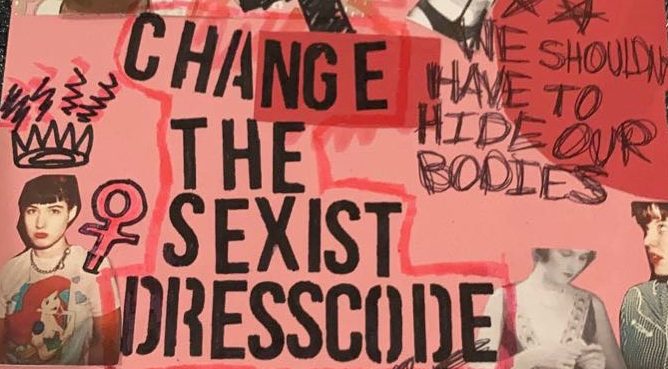Dress code movement pushes for reform
Photo via Instagram (@chngethedresscode)
Fayette County students protest the dress code in front of the October 18 Fayette County Board of Education meeting. During the public comment portion of the meeting, students from four of five county high schools spoke regarding how the dress code sexualizes women and encourages rape culture.
Earlier this week, a group of Fayette County students voiced their concerns regarding the sexist, racist, and oppressive nature of the Fayette County Board of Education dress code.
“Through the dress code, students are ignorantly being taught that women are objects. Our [clothing is the] packaging,” Whitewater High School sophomore Leanna Willett said.
It all started a few months ago when a Starr’s Mill student got dress coded for a shirt that barely showed her midriff. She expressed her discontent to other Fayette County students, and together they decided that the dress code had been taking away from young girls’ education long enough and something had to change. They have put into effect the #changethedresscode movement.
“Consider the effects of the dress code: it teaches young boys that objectification is normal and not frowned upon. [It] conveys to them that the female body is theirs to control and that men are meant to be impulsive and don’t need to restrain themselves from acting improperly,” McIntosh High School freshman Sage Shah said.
Their first step was creating a buzz. They started an Instagram account (@chngethedresscode) to spread awareness and to generate interest. Their second step was signing up to speak at the October 18 Board of Education meeting. A large group of the girls showed up before the meeting to protest outside, while four of the girls went inside to speak.
Throughout all four speeches, a common theme was that the dress code targets female and female-presenting students. They stated that when this happens, it is not only teaching young women that they need to cover up to keep themselves from sexual harassment, but it also teaches young men that it is okay to sexually assault, and even rape.
“What is there that is arousing about shoulders? I have been wearing a tank top the entirety that I have been speaking, and I can calmly say that it has caused no disruption at all,” Willett said.
The girls also talked about how the dress code takes away from the education of young girls by pulling them out of valuable class time just to tell them that they are distracting others around them, showing them that their education is not as valued as their male classmates.
Ure Nena, a graduate of Fayette County High school, brought up the point that the dress code targets students of color, by prohibiting the use of durags and bonnets. She argued that these items on a black student are against the dress code, while on their white counterparts it is a gag or a joke.
“We are not accusing Board members of racism or the people who wrote the Code of Conduct of racism, but we will absolutely point out the obvious harm of the dress code on students of color, particularly black students,” Nena said.
The girls came equipped with not just grievances against the dress code but also solutions to help fix it. They suggest that Fayette County removes:
- The no midriff rule, and instead allows no more than two inches of the stomach to show.
- The four-finger rule, and the fingertip length rule, and instead changes it to allow shorts to be the length of where the palm meets the knuckles.
- The neckline rule.
- The rule requiring all students to wear bras, and the rule not letting bra straps show.
- The rule against head coverings as long as the wearer is still identifiable.
- Standard 12, which states that gang-related clothing, bandannas, signs, symbols, and tattoos are not allowed
“Understand that if we do not see any action or change regarding our concerns, we will continue to reiterate our points and press for reform,” a senior from Fayette County High School said. This student spoke at the meeting without being named and requested to remain anonymous.
The next Board meeting will be held at 7 p.m. on November 29 at the Lafayette Education Center.



Denise • Oct 20, 2021 at 11:19 pm
The dress code is there because some students do not use good judgement as to what is appropriate and what is not. As a retired teacher I can say I have seen it all and it is usually females not males who dress inappropriately. You know the rules. If you follow them you will not be pulled out of class. Simple. Focus on learning and use your time outside of school to display your fashion sense.